Available for download by currently active customers on https://support.silverfirsoftware.com/. New Features and improvements include:
We are pleased to announce that Los Alamos National Laboratory (LANL) will be running two 'Unstructured Mesh with Attila4MC' training courses in 2026. One at the NEA in Paris, and one at Los Alamos itself. If you would like to register for either of these training courses please follow the links below.
NEA 23rd - 27th March LANL 6th - 10th April

ANS Winter Meeting - Washington DC - November 9, 2025 (PDF)
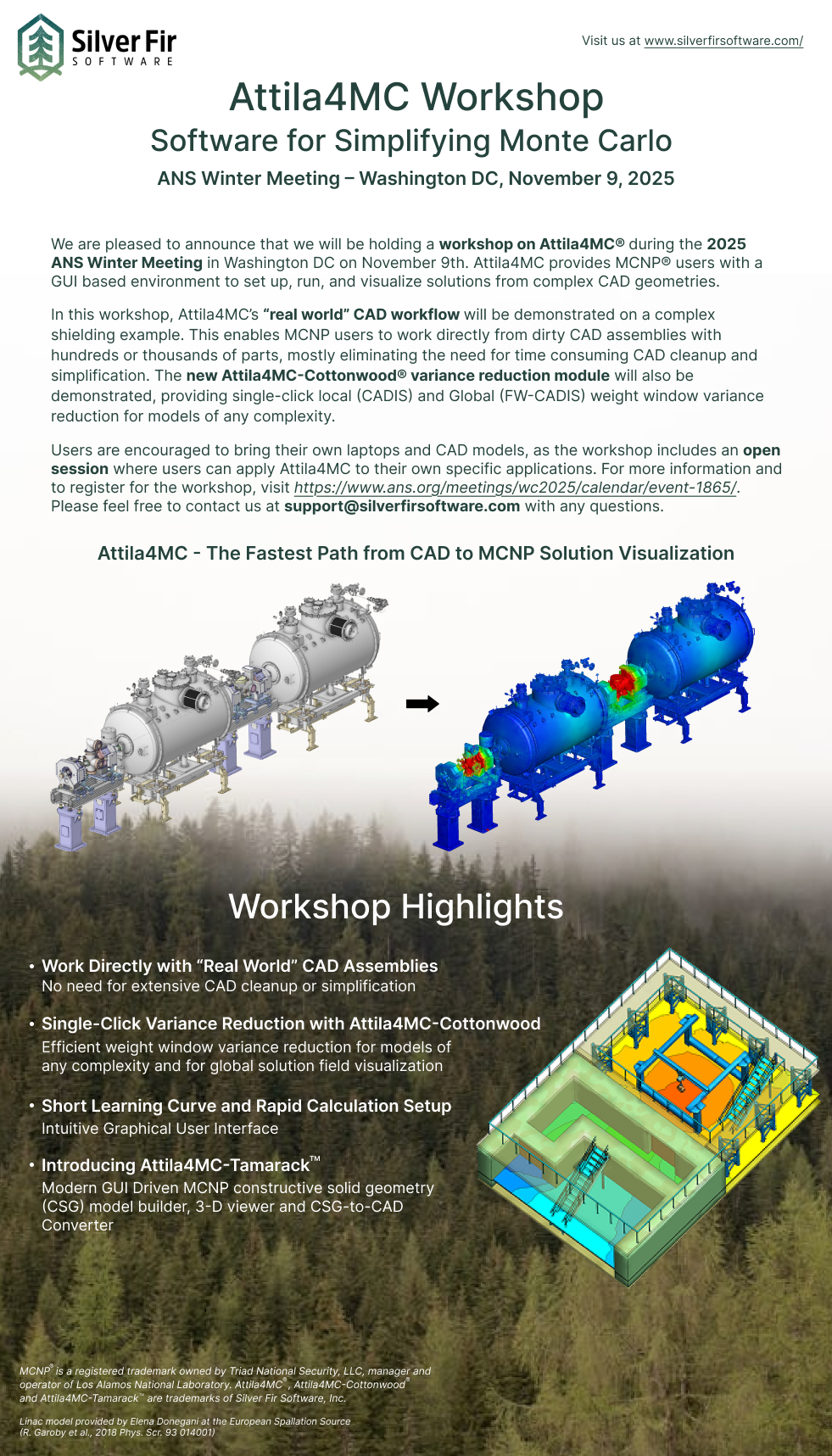
Tamarack is a modern, GUI driven, MCNP constructive surface geometry (CSG) model builder, 3D viewer and CSG-to-CAD converter. Please contact us at support@silverfirsoftware.com if you are interested in an evaluation license.
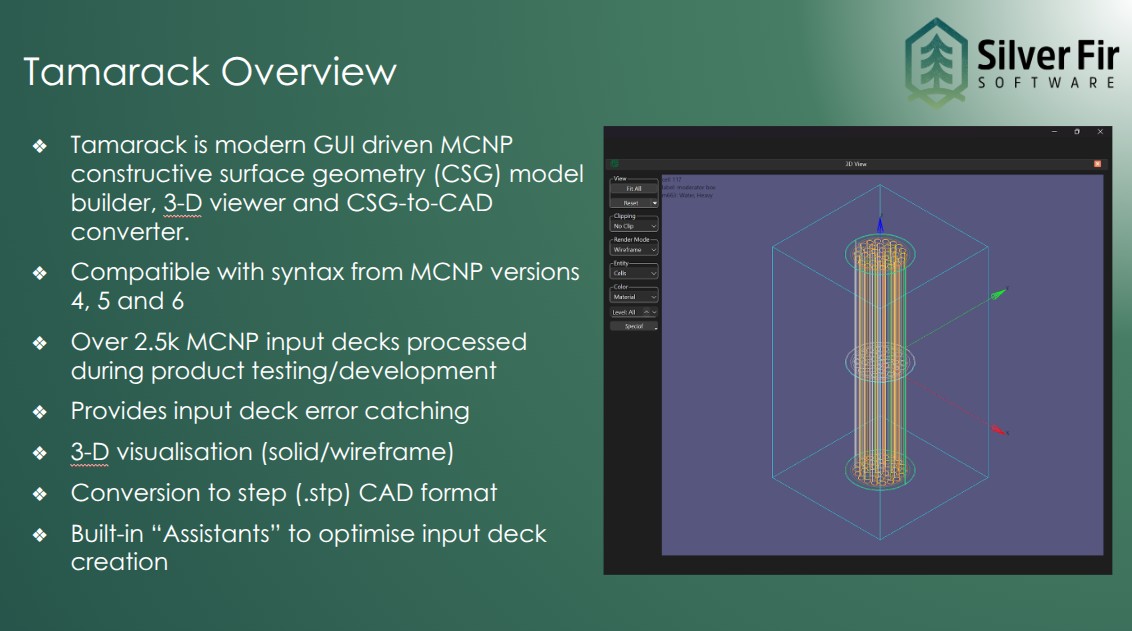
July 13th-17th 2025 - Madison, Wisconsin
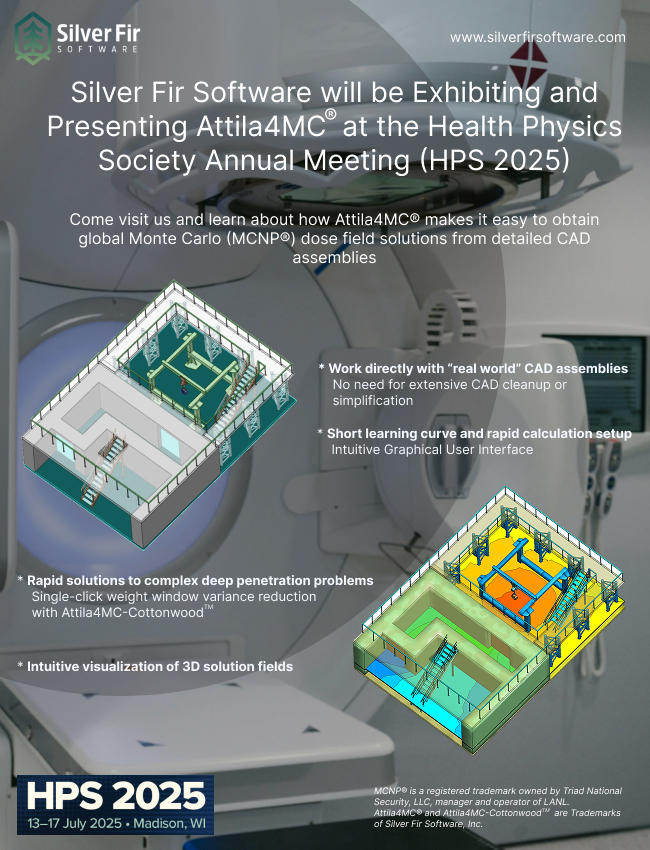
Upcoming MCNP6 With Attila4MC Training at LANL on March 31st-April 4th, 2025 (PDF)
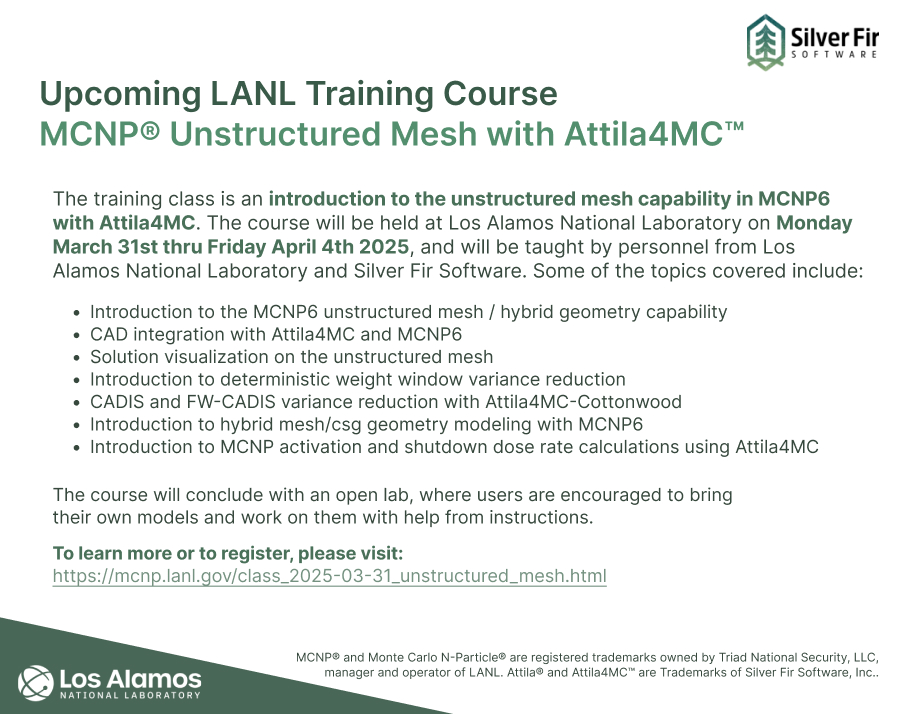
SNA + MC 2024 - Paris, France - October 20th thru 24th, 2024 (PDF)

ANS Winter Meeting/RPSD 2024 - Orlando, Florida - November 21, 2024 (PDF)

New Features - Attila/Attila4MC Version 10.3 (download)
.jpg)
We will be demonstrating upcoming new features in the Attila/Attila4MC product line at the International Conference on Physics of Reactors (PHYSOR 2024) this coming week at the Hilton Union Square Hotel in San Francisco, California. Stop by and visit us! We look forward to seeing you there.
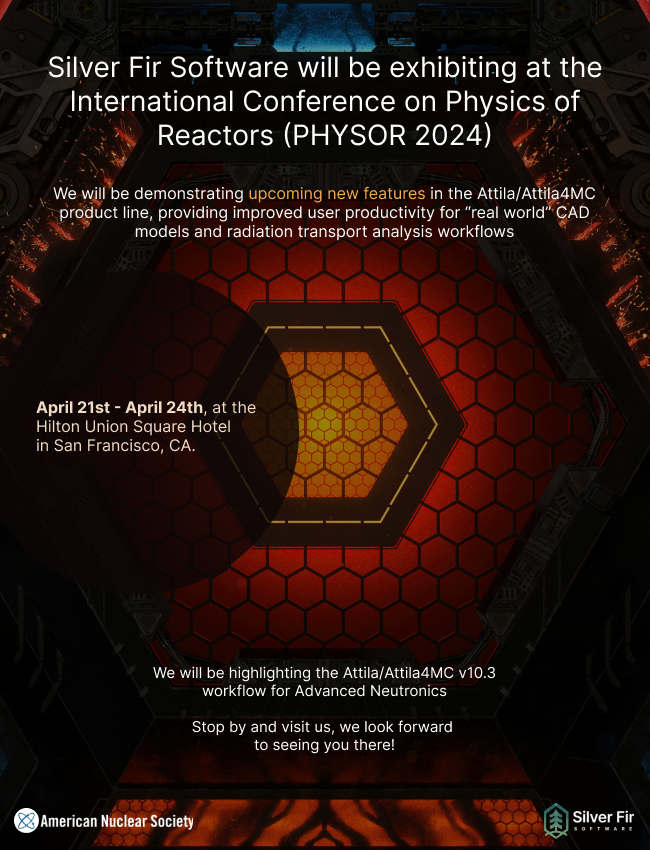
The third sportlight is: Attila4MC now supports KCODE calculations with the MCNP6 Unstructured mesh! We have added the capability to perform criticality calculations via the Attila4MC GUI providing an intuitive interface to mesh the geometry, check fidelity against the CAD model with mesh analytics, and execute calculations.
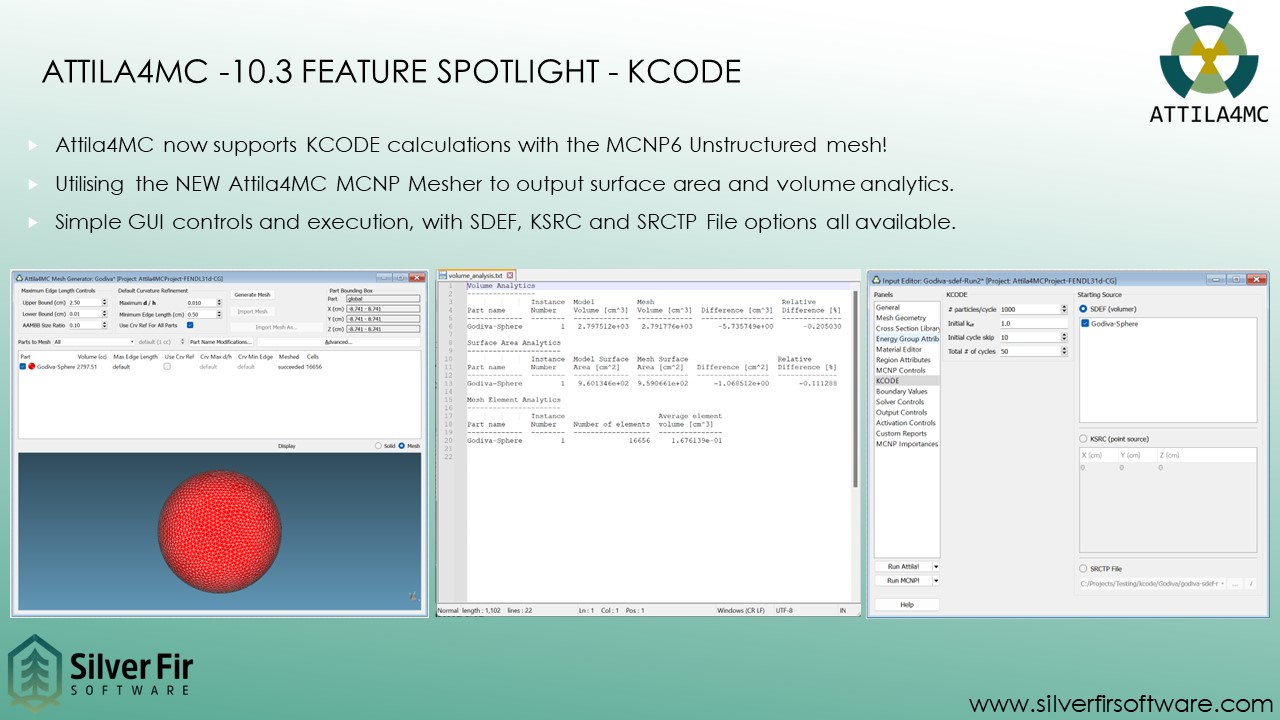
The second spotlight is our new biased quadrature set generator (DOMO), which can be used to improve and accelerate the assessment of streaming gap and "dog leg" type penetrations in radiation shielding that are commonplace in modern neutronics models.
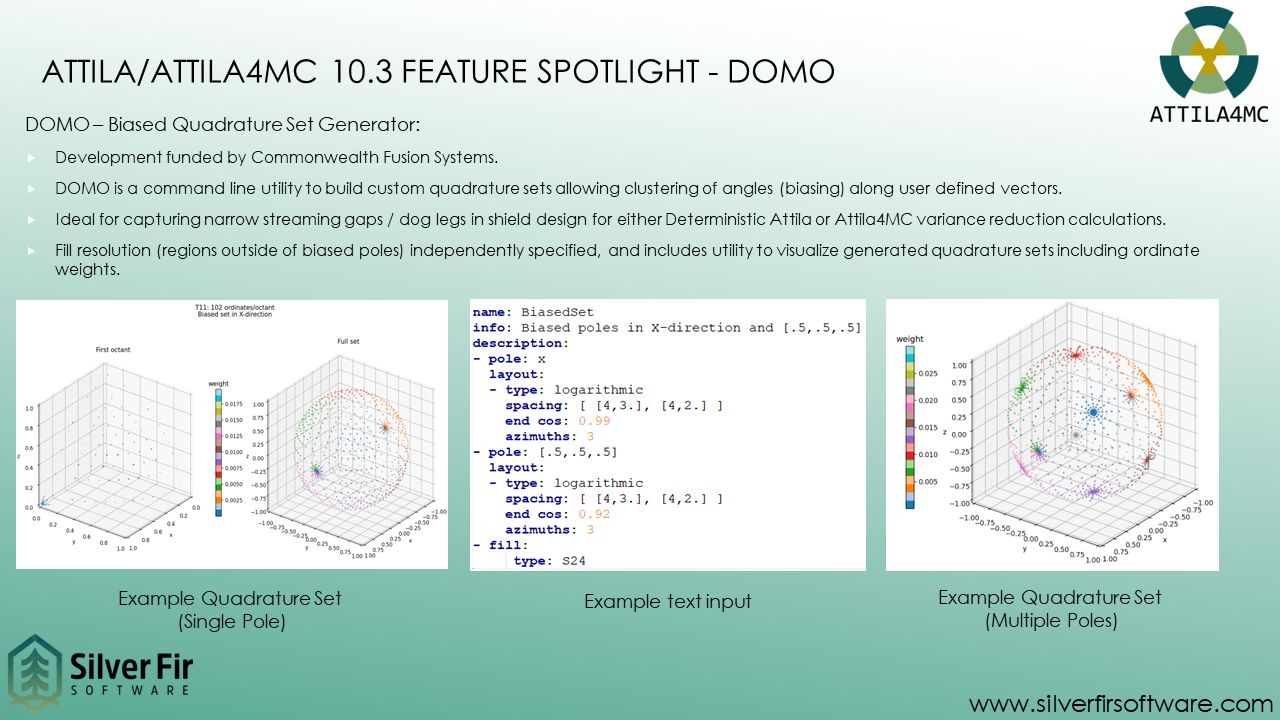
Ahead of release of Attila 10.3 we are highlighting some of the upcoming features and updates users can expect. The first spotlight is enhanced solution visualisation.

Upcoming MCNP6 With Attila4MC Training at LANL on July 22-26, 2024
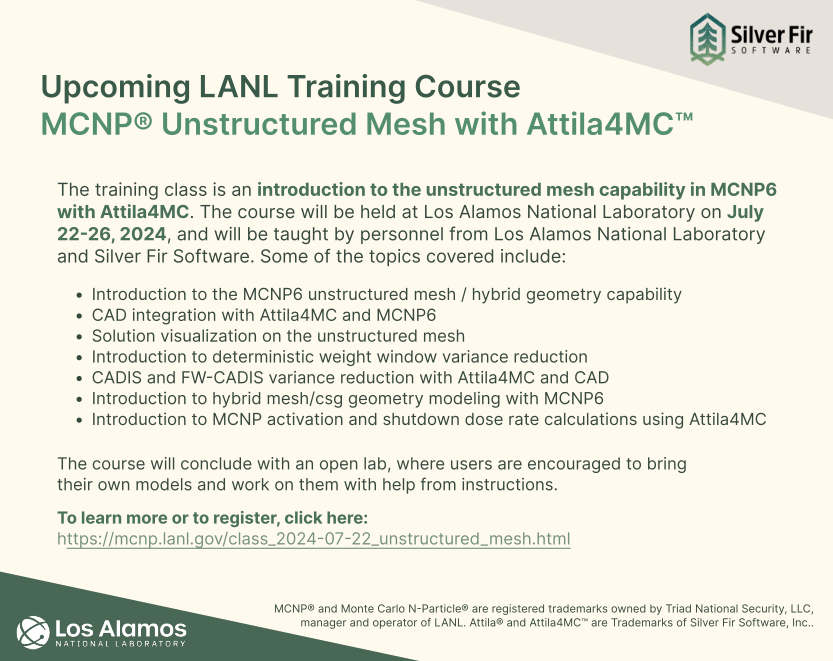
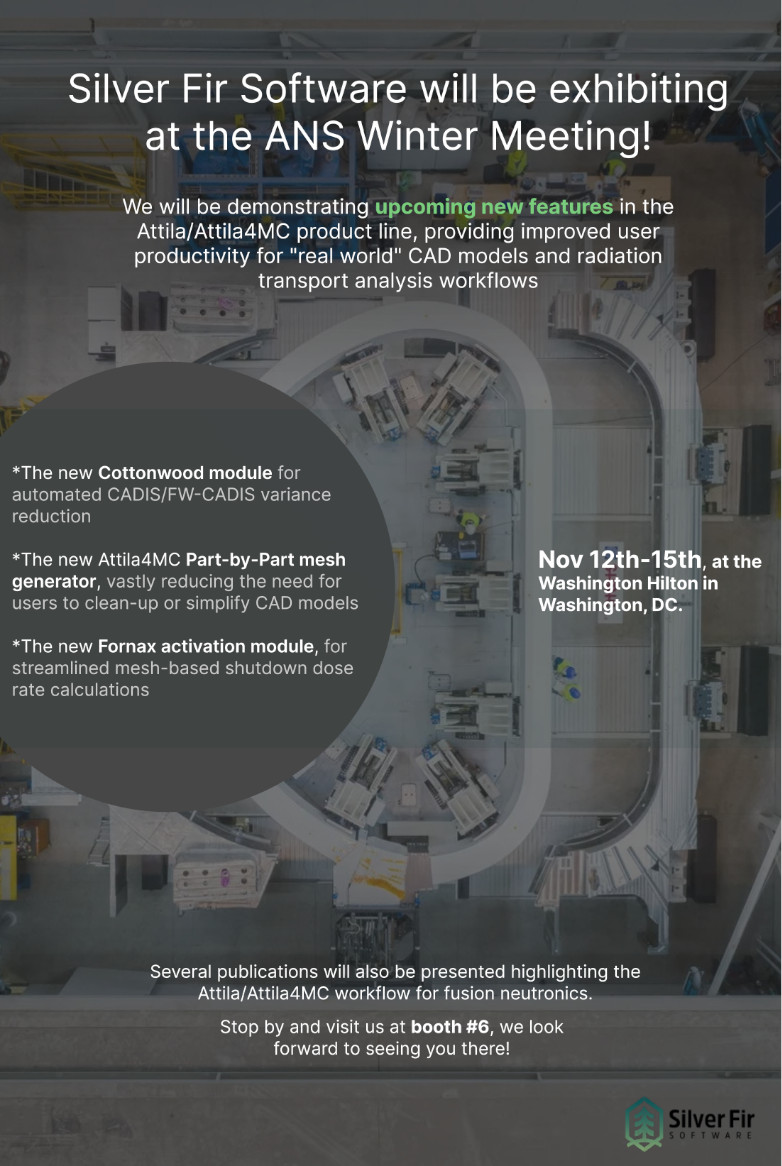
We are pleased to announce an OEM release of the new Attila4MC Part-by-Part Mesh generator, developed to simplify and automate mesh generation for complex CAD assemblies.
An OEM release (OEM 7) is now available for download and testing at www.attilasupport.com. To access, after login select Downloads then Part-by-Part Mesh Generator. This page contains a product overview, installation files, getting started instructions and tutorial examples.
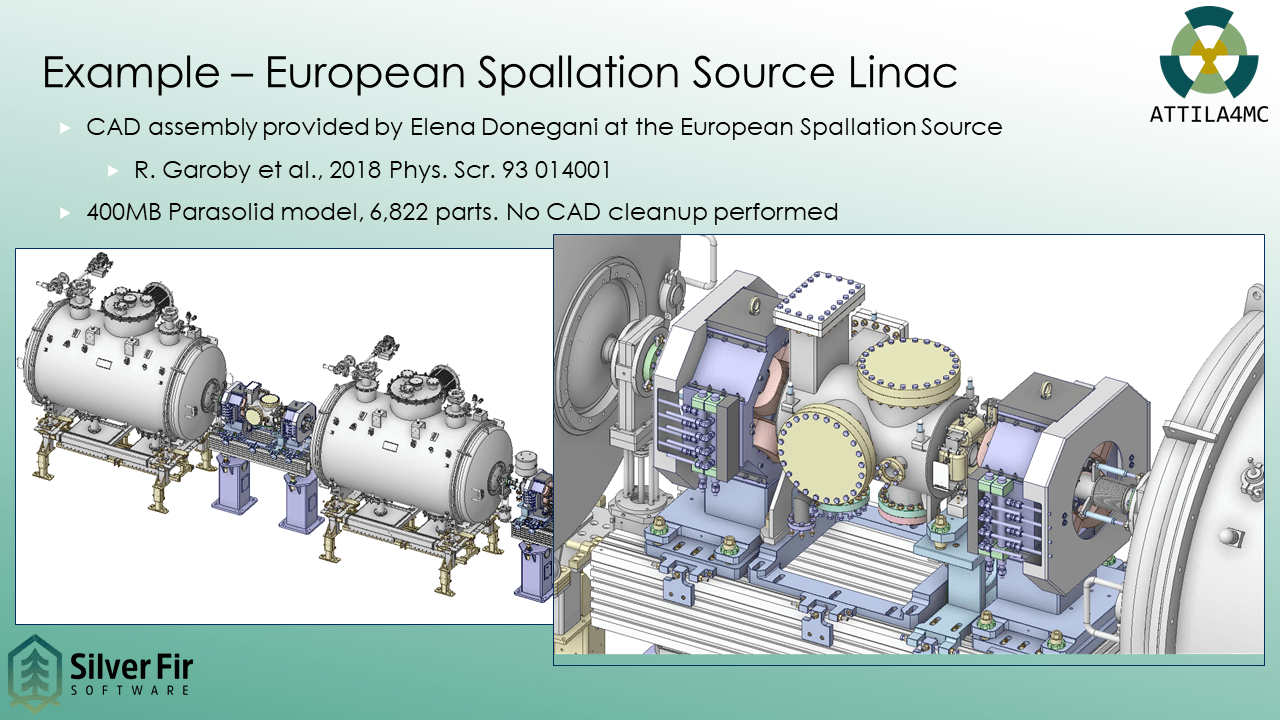
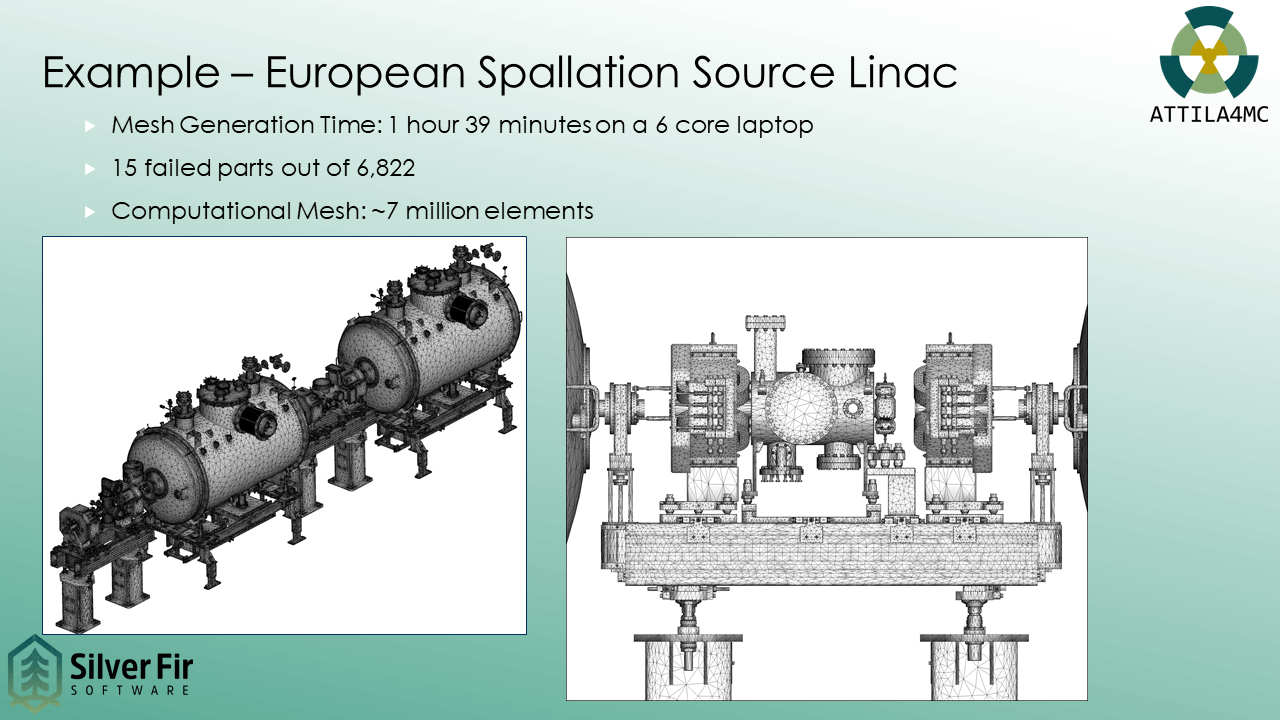
Silver Fir Software will be exhibiting at the French Society of Radiation Protection (SFRP) Conference in Paris, France on March 9-10, 2023.
For more details about the conference, visit the SFRP-2023 website. Come visit us!
Come visit us at ICRS-14/RPSD-2022 in Seattle, WA on September 25-29, 2022. We will be holding a hands-on Attila4MC/Attila workshop on Sunday, September, 25th, where we will be demonstrating new and upcoming features, and will also be exhibiting at the conference. We look forward to seeing you there!
For more details about the conference, visit the ICRS-14/RPSD 2022 website
This example assessed both neutron and secondary gamma fluence from a watt fission source in a reactor pressure vessel. The pressure vessel CAD model was imported directly into the Attila4MC GUI, allowing for unstructured mesh generation for both deterministic variance reduction (VR) and radiation transport.
SFSW-FENDL3.1d cross sections were used for the deterministic VR, allowing for 53 neutron groups and 42 gamma groups. FW-CADIS calculations were run for the neutron and secondary gamma calculations using our bespoke deterministic VR solver method LDAS to achieve uniform uncertainty throughout the geometry. Neutron calculations were run for 1E+08 particles in MCNP, and secondary gamma calculations were run for 5E+07 particles in MCNP. For comparison both cases were also run in analog MCNP.
Total variance reduction run times were 78 minutes and 37 minutes for neutrons and secondary gammas respectively.

Silver Fir Software are pleased to announce we will be exhibiting at the International Conference on Physics of Reactors (PHYSOR) 2022 on May 15-20, in Pittsburgh. Come and meet the team at Table #9 to talk about how Attila4MC could support your radiation transport workflows, and hear about our exciting developments coming this year!
For more details about the conference, visit the PHYSOR 2022 website
We are pleased to announce that Jonathan Rogers has joined the Silver Fir Software team with the title of Business Development and Technical Support Engineer. Jonathan previously worked at Atkins in the UK, and he brings valuable expertise in radiation shielding and nuclear safety analyses using a variety of codes including Attila4MC, Attila®, and MCNP®. He also has scripting and development expertise and will be contributing to ongoing development of the Silver Fir Software product suite. Jonathan will be a valuable addition to Silver Fir Software, and we look forward to working together with him.
Silver Fir Software are excited to announce we will be attending Waste Management 2022 in the Kinectrics Booth (#622) on March 6-10, 2022 in Phoenix, AZ . Several papers will be presented on the use of Attila4MC for spent fuel applications. We Attila4MC workshop will be held on Sunday, March 6th from 9:30-12:30. Workshop attendees will learn how to perform MCNP calculations using Attila4MC, with an emphasis on deep penetration shielding. Topics to be covered include importing a CAD assembly, setting up a calculation, performing weight windows variance reduction, and visualizing a calculated dose field. For more details, visit the WM 2022 website
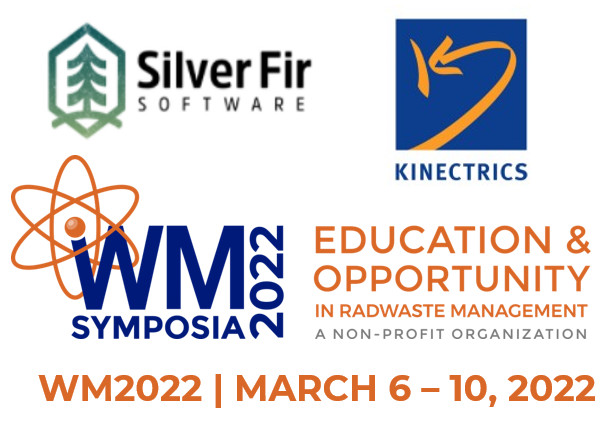
Silver Fir Software is pleased to announce the release of Attila/Attila4MC Version 10.2.0, which licensed users can download from www.attilasupport.com
Version 10.2.0 contains a number of features to significantly improve user productivity for both Attila and MCNP® calculations, some of which include:
For more information, please contact us at support@silverfirsoftware.com
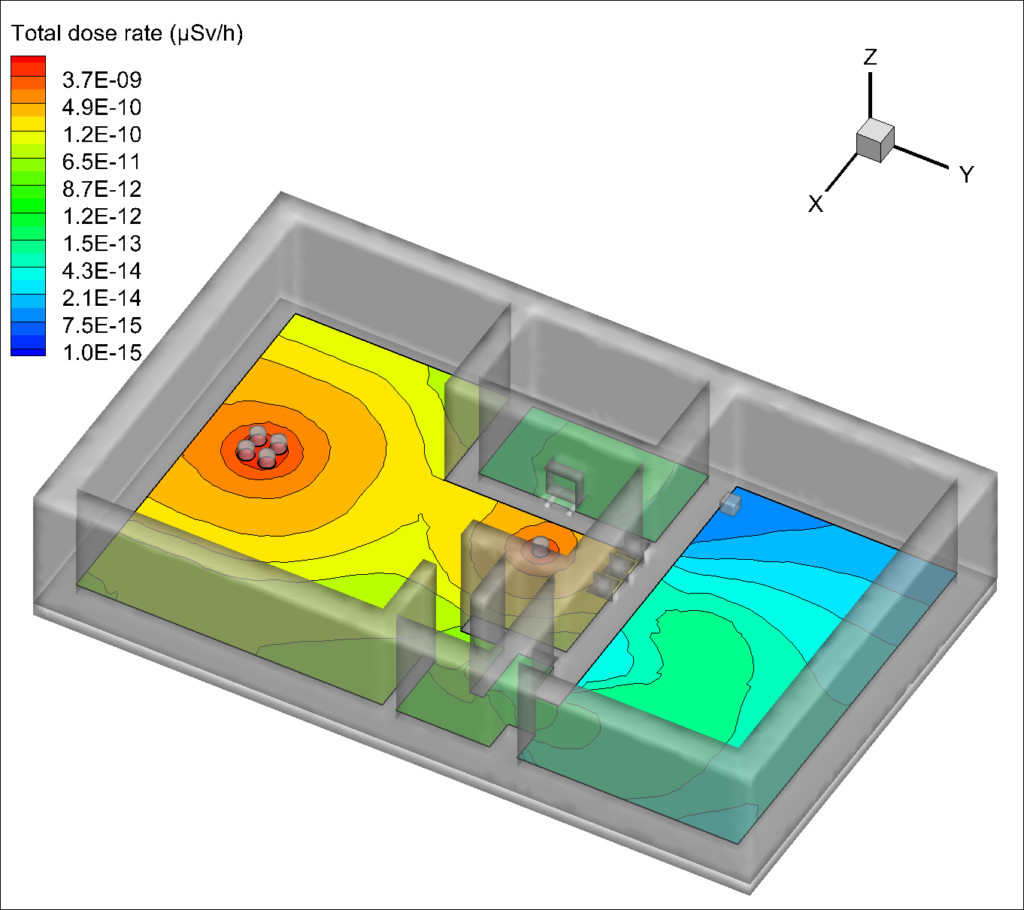
This example assessed both neutron and secondary gamma dose from a 250 MeV proton source.
The facility CAD model was imported directly into the Attila4MC GUI, allowing for unstructured mesh generation for both deterministic variance reduction (VR) and radiation transport.
HILO2K cross sections were used for the deterministic VR, allowing for neutron energies up to 2 GeV.
For comparison cases were run in analog MCNP, and with our deterministic VR solver LDAS with FW-CADIS to achieve uniform uncertainty throughout the facility.
All models were run for 1E+08 particles, variance reduction run times were 30 minutes and 13 minutes for neutrons and secondary gammas respectively.
If you would like to hear more about how our products can improve your efficiency with MCNP, please contact us on LinkedIn:
https://www.linkedin.com/company/silver-fir-software
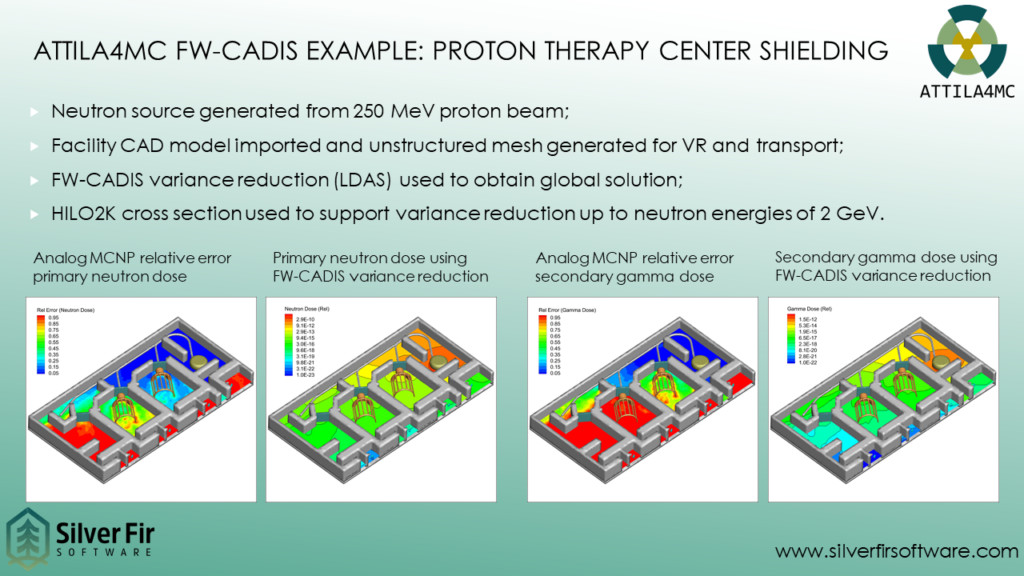
3 Aug 2021 // Silver Fir Software Inc. and Kinectrics Inc. have signed a cooperation agreement that will establish Kinectrics as a preferred training partner and user of the Attila code suite for the North American nuclear industry.
“Kinectrics is excited to work with Silver Fir Software to advance the use of Attila in the North American nuclear industry”, said David Harris, President and CEO of Kinectrics.
Read more about this exciting new initiative here: https://lnkd.in/eMVGFWw

The Grant, titled “Design Focused Product to Streamline Fusion Neutronics Calculation Workflow” will expand the capabilities of Attila4MC in support of Fusion Neutronics applications. As part of this project, Silver Fir Software will further simplify the Attila4MC process to generate an MCNP® computational model from CAD assemblies, with an emphasis on eliminating the need for users to remove insignificant part overlaps, which are common in production CAD assemblies.
A secondary emphasis of the project is to expand Attila4MC features related to activation source generation on the tetrahedral mesh. The Massachusetts Institute of Technology Plasma Science and Fusion Center will be participating as a subcontractor on this grant, and will be testing developed features on relevant SPARC tokamak models. Although the initial emphasis is on MCNP integration, the capabilities developed under this project will later be extended to support the OpenMC Monte Carlo code.

The example below produces a deterministic solution for a 1E+15 reduction in the flux field in under two minutes. Providing a quick solution to your variance reduction needs. If you want to hear more about how LDAS could improve your MCNP productivity, or any of our other products, please get in touch with one of our support team.
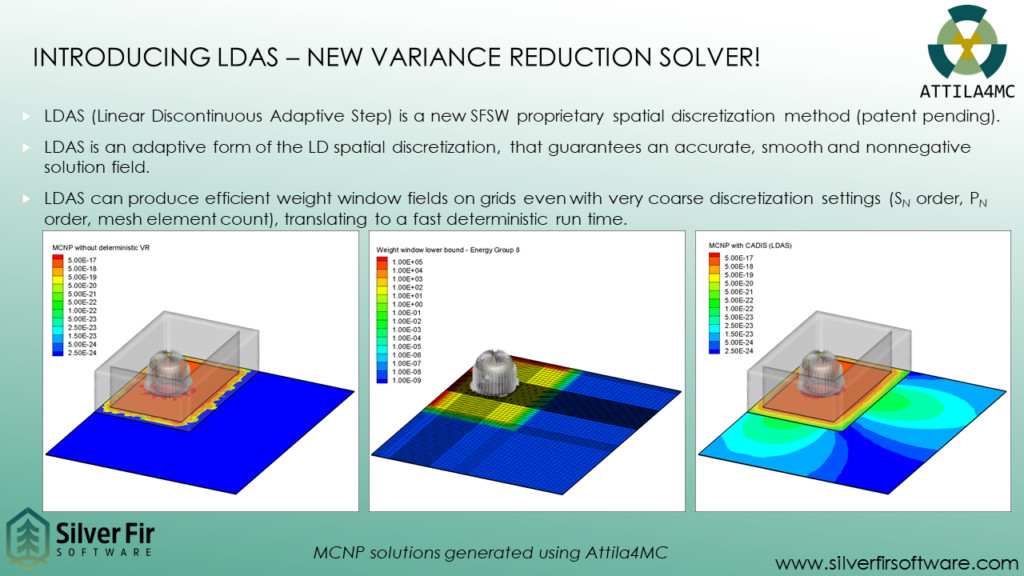
This branch will be headed up by Andrew Cooper, who joins us from Atkins, and will be based in the UK. Andrew brings with him a wealth of experience in the nuclear consulting sector with 15 years specializing in radiation transport analysis and business development for a variety of clients in the UK and abroad. As Director of the UK & Europe branch, Andrew will be responsible for Business Development and Technical Support, where his knowledge of the nuclear sector and experience with industry standard analysis codes such as MCNP and Attila will be a valuable asset to the Silver Fir Software business.
We’ve collected an extensive list of third-party technical reports and peer-reviewed publications, including radiation transport on unstructured mesh specific publications. We will be constantly updating this page; let us know if we’ve missed anything!
Attila 10.2.0-beta3 introduces the new Linear Discontinuous Adaptive to Step (LDAS*) spatial discretization, applicable for CADIS and FW-CADIS calculations with Attila4MC. LDAS is a new proprietary adaptive spatial discretization scheme that eliminates the possibility of negative flux solutions, other than those resulting from negative scattering sources, while retaining high accuracy through thick shields. LDAS can produce an accurate and smooth weight windows file for MCNP®, improving solution convergence rates. Also included in 10.2.0-beta3 is the Reprise License Manager, which provides a server based floating license capability. Attila 10.2 is scheduled for release early 2021. *Patent pending
This latest beta includes an updated mesher to improve robustness and parasolid compatibility.
This is done to smooth weight windows for problems with significant ray effects, substantially improving performance for CADIS and FW-CADIS calculations.